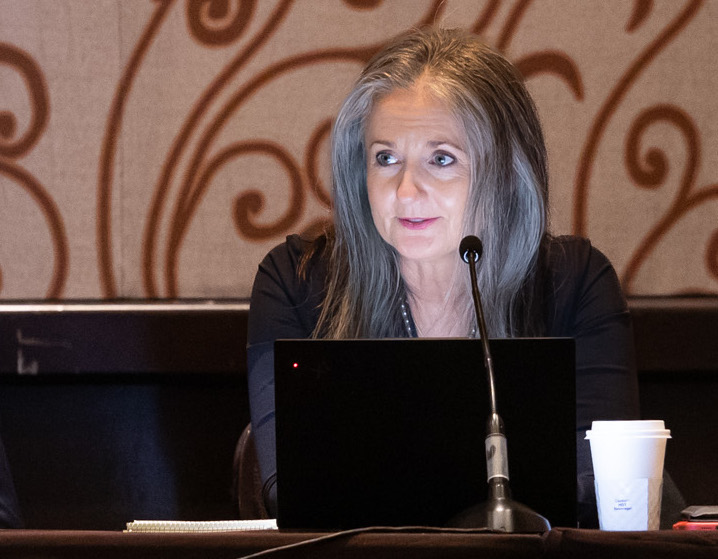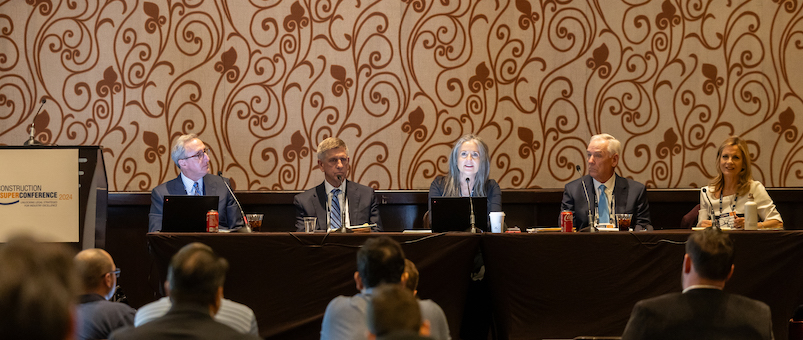LAS VEGAS – While the majority of construction law disputes are settled out of court, the skill of arguing before a jury is still a valued talent—even an art. Attendees at last year’s Construction Super Conference heard about the topic from trial experts at an illuminating panel discussion.
During the session, Marion T. Hack from Cozen O’Connor (Los Angeles office) talked about the key traits of a successful trial lawyer, all of which are on display well before the facts are laid out. “Jurors are looking to you to be the guide through the trial,” said Hack at The Cosmopolitan in Las Vegas. “If you are someone who is genuine, empathetic, and trustworthy, they are going to look to you to guide them, give them the facts, and give them what they need to know to make a decision.”
 Third Thursday checked in once again with Hack to learn more about the lessons that shaped her philosophy, as well as some common misconceptions about the art of jury trials.
Third Thursday checked in once again with Hack to learn more about the lessons that shaped her philosophy, as well as some common misconceptions about the art of jury trials.
Third Thursday: Can you fake trustworthiness and empathy?
Hack: One of the things I teach my associates, and forgive the pejorative; You can’t hide asshole. If you are a jerk, you can’t hide it because jury trials are long. You can hide it for a day or two, but eventually it comes out. Anytime you spend time with the jury, they are going to see who you really are. They’re going to see your flaws and your strengths when it comes to being a trustworthy guide. If you’re just not that kind of person, I don’t think you can cultivate it. You can mask it for a short time, but eventually the cracks show through.
Third Thursday: What’s the biggest misconception about jury trials?
Hack: The biggest misconception is that juries are unfair or won’t understand the problem that you present to them—that somehow there’s an inherent risk in jury trials that you would not have in a bench trial. I think that’s false.
Third Thursday: What is your preference?
Hack: My preference is a three-panel arbitration, because usually you have three people who are well-versed in the construction industry. My second preference is a jury trial over a bench trial.
Third Thursday: Why do you prefer the three-person arbitration panel?
Hack: The arbitration process is more streamlined. It’s much more efficient than a jury trial. The jury trial has a tremendous amount of rules, and to prepare for a jury is far more expensive. You tend to get a better and more well-reasoned decision with a panel—not that I haven’t seen panels go off the rails.
Third Thursday: Why not a bench trial?
Hack: When you have one person [bench trial], it’s just that one person. With three people you start with a group, and group dynamics are different. Those group dynamics tend to get to a better decision than one person does. The panel has a tremendous amount of experience in construction law. Comparing a jury with a single judge—it’s risky. I very much respect judges, but they have a lot on their plate. It’s quite a bit to deal with and you also have a greater possibility that the judge doesn’t understand it.
Third Thursday: What do you say to colleagues who may fear a jury trial?
Hack: If you ever watch a mock jury deliberate, it’s rather scary—but they tend to come to the right conclusion in a very weird way. I would not be fearful of juries if you’re a good practitioner and you’re able to tell a good story. Let them understand. If you let them feel like they really do understand, there’s nothing to fear.
Third Thursday: What have you been doing most in recent years?
Hack: Since Covid, the amount of jury trials has gone down. I’ve been more in arbitration than I’ve been in jury trials. I suspect I will be in a couple jury trials next year.
Third Thursday: What factors do you take into account when presenting your case?
Hack: You have to take the temperature of where people are, what their concerns are, what their anxieties are that may play into how you present your case. We have a different political situation than we had prior to Covid, so there’s a lot of anxieties and issues with attention. People have their attention diverted through social media and email, so it’s harder for people to concentrate. Remember you’re always on stage.

Third Thursday: Is there a specific issue that you anticipate will become more important?
Hack: With tariffs, the uncertainty is already being written into contracts. Believe it or not, there is not as much litigation [on tariffs] as I think we had on Covid because we’re getting better at dealing with uncertainties. The concern is that there may be more litigation initially. If construction slows down there tends to be an increase in litigation because every dollar that you’ve lost on a previous project you may not make up on a future one.
Third Thursday: When do you tend to see more settlements?
Hack: When times are good, settlements are easier. When times are bad, settlements are harder because people can’t give up the money. We might have an increase in litigation initially because companies are feeling that they don’t really have a choice. They have to recover their funds.
Third Thursday: Is there a particularly satisfying case that you recall?
Hack: I’ve had some great wins, but I think the last one [contract dispute on a design-build project] was probably the most consequential because I had a situation where we had a three-month jury trial. We were being sued for $100 million. We only had a $5 million counter claim. That’s a challenging situation. Opposing counsel was incredibly aggressive and rude—playing hardball, nasty litigation—to the point where he didn’t really talk to me. He didn’t really relate to me at all, even though I was lead trial council. It was difficult.
Third Thursday: What about the judge?
Hack: The judge wasn’t fond of me either. I was dealing with hostile opposing counsel and a hostile judge. We ended up defensing the hundred million and getting our $5 million. It ended up turning into a $17 million judgment with attorney fees, expert fees, interest, and prompt payment penalties.
Third Thursday: How interested were they in settling prior to trial?
Hack: I had tried to settle the case and couldn’t settle it at all. They were not interested. So that case was pretty satisfying.
Third Thursday: What’s a typical mistake you see from opposing counsel?
Hack: Very often, in jury trials, I see over reach on the ask of damages. You have so many damages that it’s just not a credible ask. Juries want to do the right thing, but if you over-ask, it’s problematic. It’s hard to tell a client not to over ask, but the reality is that you’ve got to be very careful about what you ask for.

